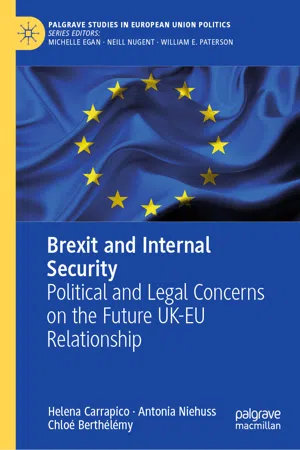Internal security—including the fight against terrorism, organised crime and cybercrime—has traditionally been one of the main concerns of the British public. In April 2017, YouGov conducted a survey which revealed that 90% of the population believes that terrorist attacks are very likely to take place in the United Kingdom (UK), while 73% believes that the threat of terrorism is rapidly increasing (Smith 2017). Compared to other European countries, the UK also has one of the highest proportions of respondents indicating that they do not consider their country to be a safe place to live, expressing concerns related to terrorism, organised crime, border insecurity and cybercrime (European Commission 2017). From a historical perspective, there has been a clear increase in anxiety, in relation to security issues, over the past 10 years; though the UK population has always had one of the highest levels of concern for insecurity among European Union (EU) countries (European Commission 2011, 2009).
Surprisingly, however, such concerns were seldom reflected in the debate running up to the EU exit referendum in June 2016. While the Remain Campaign focused on the negative consequences of Brexit for the UK’s economy , the Leave Campaign argued that the UK’s membership of the EU had led to a deterioration of the country’s sovereignty and to an inability to control UK borders, which was in turn presented as resulting in a reduced pool of available jobs and an overburdening of public services (in particular the National Health Service ). With the exception of brief references by Nigel Farage and Ian Duncan Smith to the link between free movement and the possibility of further terrorist attacks, internal security was rarely mentioned (The Guardian 2016). It was, in any case, far from being the object of serious or in-depth discussion.
This situation began to change, however, in January 2017 with Theresa May ’s Lancaster House Speech , followed by the UK government’s White Paper in February and the issuing of the letter triggering Article 50 in March. Although the objective of these three documents was to present the UK general negotiation stances and to project a vision of future UK -EU relations, they also served to highlight that security would potentially be a contentious topic in Brexit negotiations. Whereas the Lancaster House Speech referred to Britain’s willingness to continue to assist EU counterterrorism efforts through its intelligence capabilities (Prime Minister’s Office 2017a), the underlying tone of the letter triggering Article 50 was far less diplomatic. In fact, the letter warned the EU that a potential failure to reach an agreement would have serious consequences for security cooperation, and in particular for the EU’s fight against cross-border crime and terrorism (Prime Minister’s Office 2017b). This growing debate enabled the emergence of more detailed arguments, namely those of current and former security professionals. These included the views of, for instance, former Europol Director Rob Wainwright , according to whom Brexit will potentially leave the UK in a less secure position as a result of more restricted access to EU intelligence databases (Wright 2018); and Sir Richard Dearlove , former head of MI6, who argues that the EU intelligence community has more to lose from Brexit than the UK does as, in his view, most EU security arrangements have little operational impact (Reuters 2016).
If the security debate had, until then, been characterised by limited visibility in terms of the wider public, the terrorist attacks that took place between March and June 20171 brought about a repositioning of the topic (Warrell 2017). By further politicising it, these events triggered a multiplication of Brexit and security references among pre-2017 General Election discourses. Suddenly, police cuts, counterterrorism strategies, cyber threats, intelligence sharing with the EU , nuclear weapons, and the causes of terrorism were some of the main concerns being raised in the context of future Brexit negotiations. Despite an increase in the visibility of these issues, namely in the context of political party leaders’ debates and interviews,2 security proposals for Brexit negotiations remained essentially vague. In fact, despite attempts on the UK side to concretise a negotiation position in this area, namely through the production of position papers, a great deal of ambiguity remains with regards to what the future UK-EU security relationship will look like, what kind and degree of cooperation can be achieved, and how long this new relationship would take to emerge. For the moment, the only certainty is that at the end of December 2020 (on the basis of an expected transition/implementation phase), the cooperation mechanisms and instruments of the Area of Freedom, Security and Justice (AFSJ) will no longer be available to the UK, following its exit from the EU in March 2019.3 This end point will mark the conclusion of several decades of European internal security integration for the UK—a process that, although not straightforward, has come to benefit both Britain and the EU.
Even though the present book originated in a willingness to address a gap in public debates, the increased awareness of the importance of security issues in the context of Brexit negotiations enabled it to also become an instrument for exploring and responding to rapidly emerging technical policy concerns and questions. As such, this volume has a very large target audience, ranging from policy-makers and academics to members of the public interested in Brexit and security matters. It is, above all, a view of the progress achieved and the challenges remaining in current negotiations, as seen through the eyes of some of the leading academics in this field. The objectives of the book are: firstly, to contribute to the general knowledge on the risks and opportunities associated with the disentanglement of the UK from European internal security cooperation; secondly, to clarify some of the debates currently taking place within the context of the negotiations; thirdly, to inform the policy discussions which form the basis of proposed cooperation models, and which are likely to shape the...
